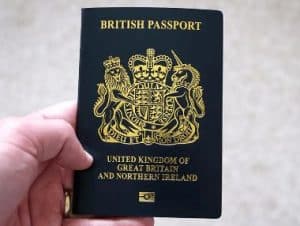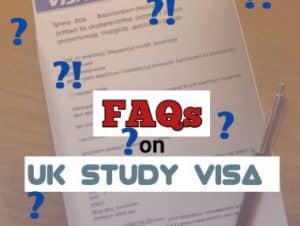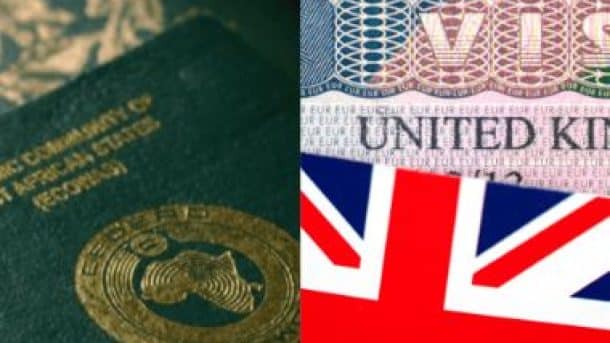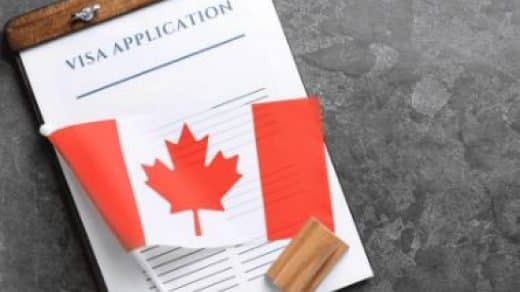Most international students require a student visa to study in the UK. Simply check the UK government website to see if you require a visa to study.
Your visa will allow you to stay and study in the UK for the duration of your course.
Applying for a Student Visa
If you are 16 or older and intend to study at a higher education level in the UK for more than six months, you will most likely need to apply for a student visa via the Student Route.
It costs £490 per applicant. If you require a priority or super-priority service, the cost will increase.
Follow this step-by-step guide when applying for your student visa:
Step 1: Apply to your selected university and get an unconditional offer.

Apply to your preferred university(s) and obtain an unconditional offer.
Step 2: Obtain your Certificate of Acceptance of Studies (CAS).
When you receive and accept your unconditional offer, your university will issue you a Certificate of Acceptance of Studies (CAS). It will cost £25.
Step 3: Start the application procedure.
Once you have received your CAS, you can begin the visa application procedure. You can apply for a student visa up to six months before your course begins. You must pay an application fee (£490 for students) and provide a valid passport.
European students: If you are from an EU nation, such as Iceland, Liechtenstein, Norway, or Switzerland, you can use the UK Immigration: ID Check app on your smartphone to complete the identity stage of your application.
Step 4: Calculate your fee and pay the Immigration Health Surcharge.
If you plan to stay in the UK and study for more than six months, you will be required to pay a cost known as an Immigration Health Surcharge (IHS).
The premium for a student visa will be £776 per year for each full year you spend in the UK. If your stay in the UK spans a portion of a year, you will be charged £388 for periods of 1-6 months and £776 for periods of 6-12 months.
The amount you have to pay is determined by how much leave you are granted. You can find out how much you’ll have to pay by using the fee calculator on the UK Visas and Immigration (UKVI) website.
European students: if you hold a European Health Insurance Card (EHIC), you may be able to request a refund for the Immigration Health Surcharge. Check the GOV.UK website to see if you’re qualified. Please keep in mind that electing to work paid part-time in the UK while studying may affect your eligibility for a refund, so think about it before requesting one.
Step 5: demonstrate your grasp of the English language (if required).
As part of your student visa application, you may be required to demonstrate your English language proficiency. Different institutions have different criteria, so check with your university to see what type of English language evidence you’ll need.
Step 6: Complete your application and have it accepted before arriving in the UK.
Before arriving in the United Kingdom, you must complete and have your application accepted.
Different sorts of visas

Visitor Route
If you’re studying in the UK at a recognized institution for less than six months, you can do so as a tourist. Many students (including those from the European Union and other qualified nations) will not require a visa for courses of less than six months.
To attend a short course in the United Kingdom, students from certain countries must apply for a regular visiting visa. Check if you need a visa to study in the United Kingdom. A normal six-month visiting visa costs £115.
If someone you know is coming to visit you on holiday in the UK, they may need to apply for a visitor visa. Find out more about visiting visas.
Short-Term Student Route
Short-term student visas are given to those who desire to learn English for six to eleven months. Learn more about the short-term study visa.
Child Student Route
If you are between the ages of four and seventeen, you can apply for a child student visa to attend a school in the United Kingdom. Learn more about kid study visas.
Need help with your student visa or anything else?
Contact your university’s international office. Your institution will advise you on your visa application; if you have any queries, please contact your university’s foreign office for assistance. Some colleges have specialist immigration consultants who are available to assist overseas students with visa applications.
Frequently asked questions (FAQ)

Can I work in the UK on a student visa?
Many international students in the UK work part-time, participate in work placements, or complete internships in addition to their studies.Most courses enable you to work up to 20 hours per week during term time.Before looking for work, check your visa and biometric residence permission, as well as your university’s requirements, to determine if there are any restrictions on the sort of work or amount of hours you can work.
European students: If you opt to work part-time in the UK, this may affect your eligibility for a refund on your Immigration Health Surcharge payment, so keep all of this in mind when deciding whether or not to work while studying in the UK.
Can I bring dependents with me on a student visa?
In October 2023, UK Visas and Immigration (UKVI) published an update stating that the following students are permitted to have dependents with them in the UK:
- Students with government sponsorship can study for 6 months or longer at a higher education provider with a track record of compliance. If the course starts after January 1, 2024, the provider must confirm it is a PhD or research-based higher degree.
- Students studying above degree level at a higher education provider with a track record of compliance on a course lasting 9 months or more, and, if the course start date is on or after 1 January 2024, the provider has confirmed the course is a PhD or other doctoral qualification, or a research-based higher degree
- Students who have permission, or had permission within the last 3 months to study on a full-time course of 6 months or longer, and who are now applying for permission to study on a full-time direction of 6 months or longer, where either: the partner or child putting on has been the student’s contingent in that moment; or the child putting on was born since the last grant of agreement to the a student, and they are submitting an application at the same time as the student or the dependent partner
Students whose children were born within the term specified in Appendix Student ST 31.2 are permitted to have that child as a dependent in the UK.
To be eligible to bring dependents on a scholarship, the scholarship must be
- A government-funded scholarship.
- A central government department covers all fees and living expenses for students.
- For more information, see pages 95 and 96 of the UK Home Office Student and Child Guidance Document.
On December 4, the Home Secretary announced updates to immigration and visa restrictions. On December 21, 2023, additional information concerning changes that may affect those who are already in the UK was provided. Until immigration rules are officially modified, the current thresholds and policies listed above remain in effect.
For further information on which students are eligible to bring dependents, please visit the UK Council for International Student Affairs (UKCISA) website.
The UKCISA website also contains a summary of changes to immigration laws issued by the Home Office and how they will effect students and their family members, under ‘Student update: amendments to the Immigration laws, December 2023’.
Can I stay in the UK after graduation?
The expiration date of your student visa is determined by the duration of your education. Make sure you know when your visa will expire so you can plan your next steps properly.
You may be able to renew your student visa if you are eligible, such as to continue your studies in the UK. If you want to stay and work in the United Kingdom, you may be eligible to change your visa type.
Visit our after-study section to discover more about your opportunities after graduation.





